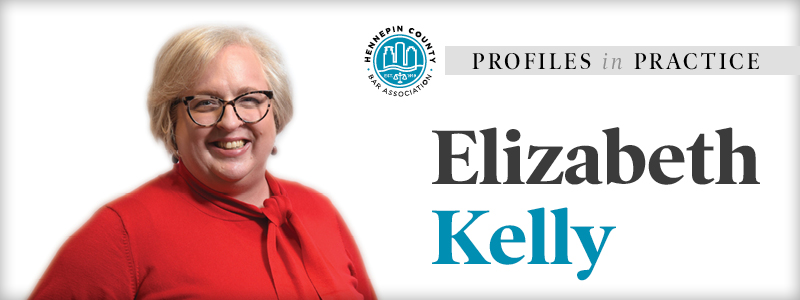
When Beth Kelly speaks with law students and mentees, she encourages them to seek their own path, “Don’t listen to what others say you should be doing, follow what you want to do. Don’t do something because the system is telling you to.” As Kelly has demonstrated in her career, charting your own professional path can lead you to some interesting and fulfilling places.
Currently, Kelly is the housing project attorney with Volunteer Lawyers Network, but her career started doing very different work.
After graduating from St. Olaf College, Kelly did not want to go grad school until she felt excited about learning and writing again. After college, she worked and volunteered abroad in Poland and Northern Ireland. She then got a job as a customer service rep and realized that to be challenged and engaged in her work, it was time for more schooling. She attended law school at the University of Oregon. While she enjoyed the rigor of law school, she never felt the big firm track was for her. "That was never what I wanted to do. And I was very clear on what I wanted to do, but it put me in a position where it was not easy to get good advice,” she said. Kelly acknowledges that law schools now provide more diverse guidance to students, but it was a bit different during her time in school, “I was a little bit on my own.”
After clerking for a federal judge in Las Vegas, Kelly moved back to Minnesota and took a job with the Office of the Monitor where she worked on class action litigation for Black farmers. While she enjoyed the work, the job ended when the litigation finished, and she didn’t know what to do next.
She thought she needed to do some “real legal work” and she got a job with the Minneapolis City Attorney’s Office. After working with the city for five years, Kelly has gone on to work as a prosecutor, associate general counsel for the Minnesota Department of Corrections, and managing e-discovery for another law firm. While she never had an official “landing spot” for her career, she enjoyed the experience and learning more about what she wanted out of her law career. “It was about finding where my next step was, but not having a long-term goal of where I would end up,” she said.
 “Don’t listen to what others say you should be doing, follow what you want to do. Don’t do something because the system is telling you to.”
“Don’t listen to what others say you should be doing, follow what you want to do. Don’t do something because the system is telling you to.”
Her varied career path has benefited her in her current role at VLN, where she has a variety of responsibilities. “A lot of things I’ve done have come together,” she said. “By prosecuting I have a lot of courtroom experience. I’ve managed caseloads from numerous different jobs. I’ve done a lot of training of others, and mentoring lawyers. I get to do all of those things in my current job. I wasn't thinking that when I took this job, but once I started doing it, I thought I know how to do this courtroom stuff, I knew how to do X, Y, Z. It's just kind of come together very nicely.”
Kelly started working at Volunteer Lawyers Network in June of 2020. Even though she’s worked remotely the entire time, she loves working at the organization and she has found a passion for housing law. She’ll appear in housing court on behalf of clients, mentor attorneys on trials, lead trainings on evictions to nonlawyers, and run the Ramsey County Housing Court clinic, as well as eviction expungement work.
With a looming crisis due to evictions, Kelly encourages other attorneys to take part in pro bono work, especially related to housing. One easy way for attorneys to get involved is through eviction expungements. Minnesota law makes it difficult for tenants to remove an eviction from their record—even if their case is dismissed. “The moment an eviction is filed against [a tenant] it is on the court record unless the court expunges it. Even if the landlord dismisses the case before if it is even heard by the court, there's still an eviction listed on the tenants record for tenant screening purposes,” said Kelly. This can often affect a tenant’s ability find quality housing in the future. “An attorney’s help can greatly increase the success of an eviction expungement even getting before a judge, due to the minute administrative requirements,” said Kelly.
However, Kelly mentions that attorneys can provide pro bono help fairly easily, “Volunteering on an eviction expungement is a finite task that doesn’t drag on, [and] as such is a nice way to provide service to a person in real need that fits into a busy lawyer’s schedule.”
When Kelly isn’t working, she enjoys spending time with her family: husband, daughter, stepdaughter, and dog, Holly.
Even though Elizabeth Kelly hasn’t had the traditional career path of a lawyer, she wouldn’t be doing anything else. “I love being a lawyer. I find it engaging and challenging and I'm intellectually interested and challenged by the work that I do.”
By Satveer Chaudary
s@chaudlaw.com
 Mr. Chaudhary is an immigration attorney in Minneapolis, specializing in criminal defense of noncitizens and complex immigration circumstances. He lectures frequently on immigration topics and writes an immigration blog at immigrationqa.com. He also offers consultations to attorneys representing noncitizens in any matter.
Mr. Chaudhary is an immigration attorney in Minneapolis, specializing in criminal defense of noncitizens and complex immigration circumstances. He lectures frequently on immigration topics and writes an immigration blog at immigrationqa.com. He also offers consultations to attorneys representing noncitizens in any matter.